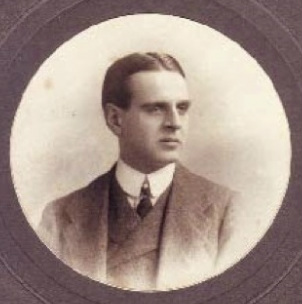
Neighbour Turned Against Neighbour
Claire Botcherby, March 2014
We often hear about the disturbing deaths of our young soldiers and servicemen.
But the war also caused tragedy at home. It broke up families and it even split communities.
Claire tells the deeply moving story of her family at Ashley during the Great War.
Her grandfather Reginald (left), grandmother Gertrude and her father Paul were affected by the war in a shocking way.
Photos courtesy Claire Botcherby
Claire Botcherby, March 2014
We often hear about the disturbing deaths of our young soldiers and servicemen.
But the war also caused tragedy at home. It broke up families and it even split communities.
Claire tells the deeply moving story of her family at Ashley during the Great War.
Her grandfather Reginald (left), grandmother Gertrude and her father Paul were affected by the war in a shocking way.
Photos courtesy Claire Botcherby
My grandparents were living
in Box village when my father was born in August 1906. They subsequently moved
to Ashley Cottage on the Ashley Estate in about 1908. My grandfather, Reginald
Botcherby, worked as private secretary to Sir Charles Morley of Shockerwick
House (Liberal MP for Breconshire 1895-1906). He is listed as an estate tenant
in the 1912 auction details for the Ashley Estate when it was put up for
sale.[1]
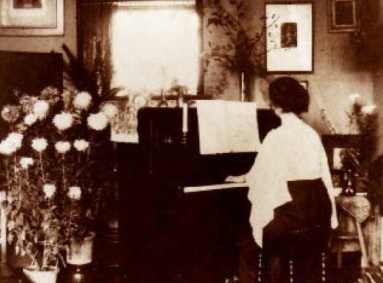 Gertrude playing the piano at home in 1906
Gertrude playing the piano at home in 1906
Both my grandparents were musical: he played the organ and conducted the choir at a local church – I think St Peter’s, Monkton Farleigh, as I have various letters from the Rector, Reginald Townshend Selwyn, mentioning the choir; she sang in the choir too, and also played the piano and cello.
In February 1905, my grandmother joined the Kingsdown Golf Club. I have a letter from A B Pinckney of The Orchard, Bathford, setting out the costs of membership then. The entrance fee was 5/- plus a further 5/- as an annual locker fee (a Mrs Kalbitzer was in charge of allocating lockers). Then, once elected, annual membership for an individual was one guinea, or £1/11/6d for a family. Guests staying with a member had the privilege of playing without payment.
In February 1905, my grandmother joined the Kingsdown Golf Club. I have a letter from A B Pinckney of The Orchard, Bathford, setting out the costs of membership then. The entrance fee was 5/- plus a further 5/- as an annual locker fee (a Mrs Kalbitzer was in charge of allocating lockers). Then, once elected, annual membership for an individual was one guinea, or £1/11/6d for a family. Guests staying with a member had the privilege of playing without payment.
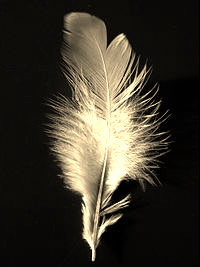
White Feather Given
A rather unpleasant war-related incident finally drove my grandparents from Box. In 1916, my grandfather was 39 and probably thought he was too old to go to war. In May that year,
the Military Service Act extended liability for military service to married men between 18 and 41, so he now fell within the age range for call-up.
By June-July, he had joined up as a Private in the Welsh Regiment [2] following receipt of at least one anonymous white feather - in fact, I think there were three or four - reputedly sent by goodly ladies of the locality.
His employer had already told him that his job wouldn’t be held open for him if he volunteered to join up, but he was probably too mortified not to (I don’t believe he was actually called up under the Act).
A rather unpleasant war-related incident finally drove my grandparents from Box. In 1916, my grandfather was 39 and probably thought he was too old to go to war. In May that year,
the Military Service Act extended liability for military service to married men between 18 and 41, so he now fell within the age range for call-up.
By June-July, he had joined up as a Private in the Welsh Regiment [2] following receipt of at least one anonymous white feather - in fact, I think there were three or four - reputedly sent by goodly ladies of the locality.
His employer had already told him that his job wouldn’t be held open for him if he volunteered to join up, but he was probably too mortified not to (I don’t believe he was actually called up under the Act).
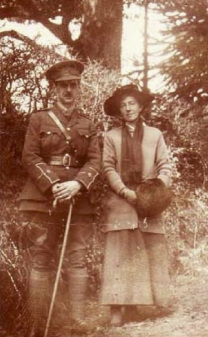
Life Suddenly Changed
My grandmother, unhappy about remaining in Ashley close to the feather-senders (she had a pretty good idea who they were) moved, with her small son, to camp temporarily with her family in Exeter.
Their income dropped overnight by over two-thirds and from her surviving correspondence, it’s clear that she seriously struggled to keep her head above water for the rest of the war.
My grandfather was wounded in France, but survived the war, ending up as a temporary 2nd lieutenant. They never recovered financially. My father, too, had hated the sudden uprooting from his beloved home in Box.
Photo left: Reginald and Gertrude in 1917
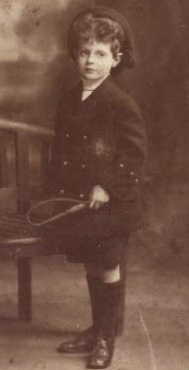 Paul Botcherby aged 6
Paul Botcherby aged 6
I remember family trips to the village to see Ashley Cottage, their old house. He even considered buying it when it came up for sale in 1959. He always felt that the feathers incident had disrupted his childhood and adversely affected the rest of his parents’ lives.
As a child, my father was besotted with steam railway engines and apparently spent hours watching them emerge from the Box tunnel, much as did the Rev W V Awdry of Thomas the Tank Engine fame just a few years later. Perhaps this was a common pastime for local boys?
During the 1926 General Strike, my father, then a student in London, couldn’t resist the opportunity to return to Box and take a turn in manning the signal box to keep the trains running.
I imagine that my grandfather was not the only local white feather recipient. I’d be interested to know if other people are aware of white feather-sending at this time in Box. Maybe even from records of the senders?
Or possibly records of a village meeting where it might have been discussed?
As a child, my father was besotted with steam railway engines and apparently spent hours watching them emerge from the Box tunnel, much as did the Rev W V Awdry of Thomas the Tank Engine fame just a few years later. Perhaps this was a common pastime for local boys?
During the 1926 General Strike, my father, then a student in London, couldn’t resist the opportunity to return to Box and take a turn in manning the signal box to keep the trains running.
I imagine that my grandfather was not the only local white feather recipient. I’d be interested to know if other people are aware of white feather-sending at this time in Box. Maybe even from records of the senders?
Or possibly records of a village meeting where it might have been discussed?
|
I was in two minds about telling
this story (my grandparents would not have approved) but ultimately felt it was
an unfortunate facet of Box village life during WW1 that should be recorded.
|
Are There More |
References
[1] See The History of Ashley
[2] Their letterhead shows the spelling as Welch, although they also use the spelling Welsh. The regiment was based at Brecon – Sidney Robinson’s constituency - which is probably why he chose to join it.
[3] The white feather was often used as a symbol of cowardice. It may derive from cockfighting where a bird with a white tail feather was supposed to be a poor fighter.
[1] See The History of Ashley
[2] Their letterhead shows the spelling as Welch, although they also use the spelling Welsh. The regiment was based at Brecon – Sidney Robinson’s constituency - which is probably why he chose to join it.
[3] The white feather was often used as a symbol of cowardice. It may derive from cockfighting where a bird with a white tail feather was supposed to be a poor fighter.